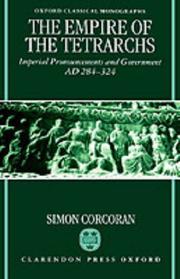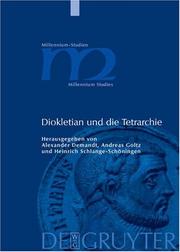| Listing 1 - 4 of 4 |
Sort by
|
Book
ISBN: 3110747006 3110740664 9783110747003 9783110740660 9783110747102 3110747103 Year: 2021 Publisher: Berlin ; Boston : De Gruyter,
Abstract | Keywords | Export | Availability | Bookmark
 Loading...
Loading...Choose an application
- Reference Manager
- EndNote
- RefWorks (Direct export to RefWorks)
Gewalt ist ein zentrales Thema in De mortibus persecutorum, einer der bedeutendsten Quellen zur tetrarchischen Christenverfolgung. Gianna Zipp nimmt die Schrift als literarisches Gesamtwerk in den Blick und arbeitet feinschrittig mittels eines close reading die Konzeption des Werkes heraus. Sie weist nach, wie Laktanz glaubhaft macht, dass die gewalttätigen Tetrarchen ihrem von Gott bestimmten, grausamen Ende zugeführt werden. Violence is a central topic in De mortibus persecutorum, one of the most significant sources on the Tetrarchy's persecution of Christians. Gianna Zipp examines this piece of writing as a literary complete works and meticulously analyzes its conception using the method of close reading. She shows how Lactantius credibly portrays the violent Tetrarchs coming to their horrific end as determined by God.
LITERARY CRITICISM / Ancient & Classical. --- Lactantius. --- Late Antiquity. --- Tetrarchy. --- violence.

ISBN: 0198149840 9780198149842 Year: 1996 Volume: *10 Publisher: Oxford: Clarendon,
Abstract | Keywords | Export | Availability | Bookmark
 Loading...
Loading...Choose an application
- Reference Manager
- EndNote
- RefWorks (Direct export to RefWorks)
Droit romain --- --Empereur --- --Décret --- --Empire romain --- --284-337 --- --Rome --- Rome --- History --- -History --- -Rome --- -Droit romain --- Diocletian, 284-305 --- Constantine the Great, 306-337 --- Rome - History - Diocletian, 284-305. --- Rome - History - Constantine I, the Great, 306-337. --- Tetrarchy. --- Empereur --- Décret --- Empire romain --- Rome - History - Constantine I, the Great, 306-337 --- Rome - History - Diocletian, 284-305

ISBN: 3110182300 3110914603 3111819841 Year: 2004 Volume: 1 Publisher: Berlin ; New York Walter de Gruyter
Abstract | Keywords | Export | Availability | Bookmark
 Loading...
Loading...Choose an application
- Reference Manager
- EndNote
- RefWorks (Direct export to RefWorks)
"As a statesman a genius of the first order" was Theodor Mommsen's verdict in 1886 on Diocletian, the Dalmatian whose career took him from a released slave to Emperor. Diocletian stabilised the Imperium after it had been thrown into turmoil in the imperial crisis of the period of military anarchy. After his abdication in 305, he retired to the magnificent palace of Spalato (Split, Croatia) built for his old age. Although his arrangements for the succession, his price controls and his anti-Christian policies were not a lasting success, his comprehensive reforms created the basis for Constantine and the transition to the Late Classical Age. Renowned scholars from Germany, Great Britain, Croatia, Slovenia and Switzerland contributed to an international conference held in Split in 2003. Their papers collected here show the present state of research on the Tetrarchy in its political, social, economic, ideological, historico-religious and archaeological aspects and on the reception of Diocletian up to modern times. "Ein staatsmännisches Genie ersten Ranges", so nannte Theodor Mommsen 1886 Diokletian, jenen Dalmatiner, der es vom Freigelassenen bis zum Kaiser gebracht hatte. Diokletian hat das in der Reichskrise der Soldatenkaiserzeit zerrüttete Imperium wieder stabilisiert und sich nach seiner Abdankung 305 in den großartigen Alterspalast Spalato (Split, Kroatien) zurückgezogen. Wenn er auch mit seiner Nachfolgeregelung, seiner Preiskontrolle und seiner christenfeindlichen Politik keinen dauerhaften Erfolg hatte, so boten doch seine umfassenden Reformen die Voraussetzungen für Constantin und den Übergang in die Spätantike. Die hier vorgelegten Beiträge der 2003 in Split durchgeführten internationalen Tagung namhafter Gelehrter aus Deutschland, Großbritannien, Kroatien, Slowenien und der Schweiz präsentieren die Forschungslage zur Tetrarchie, zu ihren politischen, sozialen, ökonomischen, ideologischen, religionshistorischen und archäologischen Aspekten sowie zur Rezeption Diokletians bis in die Neuzeit.
Diocletian, --- Diocletianus, --- Dioklecijan, --- Diokletian, --- Diokghetianos, --- Diocleziano, --- Diocleciano, --- Cayo Aurelio Valerio Diocleciano, --- Rome --- Rim --- Roman Empire --- Roman Republic (510-30 B.C.) --- Romi (Empire) --- Byzantine Empire --- Rome (Italy) --- History --- Diocletian, Emperor of Rome --- Congresses --- Diocletian, 284-305 --- Empire, 284-476 --- Diokletian. --- Rezeption. --- Tetrarchie. --- HISTORY / Ancient / General. --- Tetrarchy --- Diocletian
Book
ISBN: 9783515124041 3515124047 9783515124072 3515124071 Year: 2020 Publisher: Stuttgart : Franz Steiner Verlag,
Abstract | Keywords | Export | Availability | Bookmark
 Loading...
Loading...Choose an application
- Reference Manager
- EndNote
- RefWorks (Direct export to RefWorks)
This book focuses on the functioning of Roman leadership in the period of the Tetrarchs to Theodosius (284-395). Our volume starts from the idea that the imperial and ecclesiastical administrations became interdependent in this period and thus presents an integrated approach of imperial and religious leadership. As the spread of ideology plays a key role in creating societal consensus and thus in wielding power successfully, the volume analyses both types of leadership from an ideological angle. It examines the communicative strategies employed by Roman emperors and bishops through analyzing the ideological messages that were disseminated by a variety of media: coins, architectural monuments, literary and legal texts. The central question of this volume is how, in a period in which an important shift took place in the power balance between church and state, emperors and bishops made use of ideology to bind people to them and thus to interact with their 'crowds', whether they be the inhabitants of the city of Rome or Constantinople, the subjects of the Empire at large or the members of the various religious communities.
Ideology --- Leadership --- Leadership. --- 284-476. --- Rome (Empire). --- Rome --- History --- E-books --- Repräsentation --- Macht --- Führung --- Geschichte 284-395 --- Römisches Reich --- (Produktform)Electronic book text --- Roman Empire --- Roman History --- Roman bishops --- Roman crowds --- Roman emperors --- Roman ideology --- Roman imperial leadership --- Theodosius --- ecclesiastical administration --- imperial administration --- tetrarchy --- (VLB-WN)9553 --- Führen --- Führerschaft --- Personalführung --- Mitarbeiterführung --- Menschenführung --- Führungsverhalten --- Führungslehre --- Führungstheorie --- Management --- Politische Macht --- Soziale Macht --- Sozialer Einfluss --- Autorität --- Einfluss --- Gewalt --- Herrschaft --- Machtlosigkeit --- Imperium Romanum --- Reich Rom --- Italien --- Antike --- Römerzeit --- Römer --- v753-500 --- Geschichte 753 v. Chr.-500 --- Idéologie --- Ideology. --- Congresses. --- 284-476
| Listing 1 - 4 of 4 |
Sort by
|

 Search
Search Feedback
Feedback About UniCat
About UniCat  Help
Help News
News